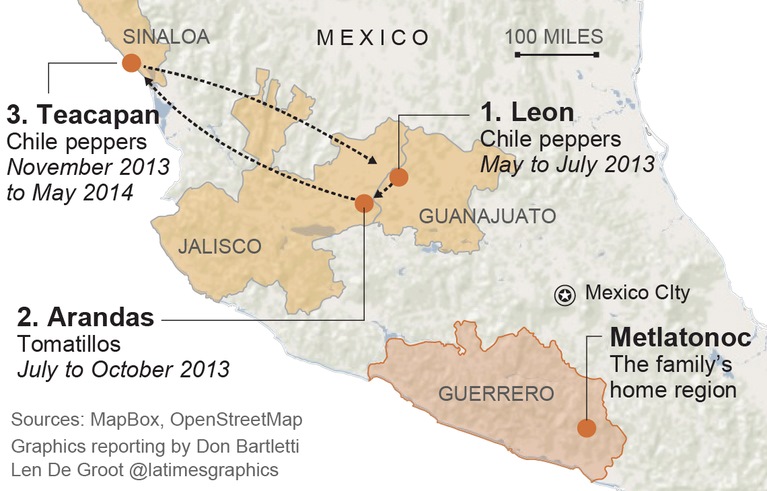A week ago, we highlighted the first of a series of four articles in the LA Times about the living and working conditions faced by migrant farmworkers in Mexico as they harvest crops that end up on dinner tables not only in Mexico, but also in the USA. The other three articles in the series are just as disturbing, but make for compelling reading.

The pilgrimage of 12-year-old Alejandrina Castillo during a single year as she accompanies her migrant farmworker parents. Credit: LA Times
The journalist and photographer responsible for this series of articles deserve high praise for their persistence and determination in exposing some of the “dirty little secrets” of Mexico’s agribusiness sector.
Links to the full series on the LA Times website:
Part 1: Hardship on Mexico’s farms, a bounty for U.S. tables – Farm exports to the U.S. from Mexico have tripled to $7.6 billion in the last decade, enriching agribusinesses, distributors and retailers. But for thousands of farm laborers south of the border, the boom is a story of exploitation and extreme hardship.
Part 2: Desperate workers on a Mexican mega-farm: ‘They treated us like slaves’ – A raid exposes brutal conditions at Bioparques, one of Mexico’s biggest tomato exporters, which was a Wal-Mart supplier. But the effort to hold the grower accountable is looking more like a tale of impunity.
Part 3: Company stores trap Mexican farmworkers in a cycle of debt – The company store is supposed to be a lifeline for migrant farm laborers. But inflated prices drive people deep into debt. Many go home penniless, obliged to work off their debts at the next harvest.
Part 4: Children harvest crops and sacrifice dreams in Mexico’s fields– About 100,000 children under 14 pick crops for pay at small- and mid-size farms across Mexico, where child labor is illegal. Some of the produce they harvest reaches American consumers, helping to power an export boom.
Related posts:

Some time during 2010 – 2011 Bill Clinton uttered a “mea culpa” for the destruction of rice production in Haiti …as the direct result of NAFTA treaty agreements and US/Canadian agreements … so you can be sure that this same scenario is being played out throughout Central and South America and Caribbean Islands as well … the agri-business and manufacturers donated heavily to Obama campaign …